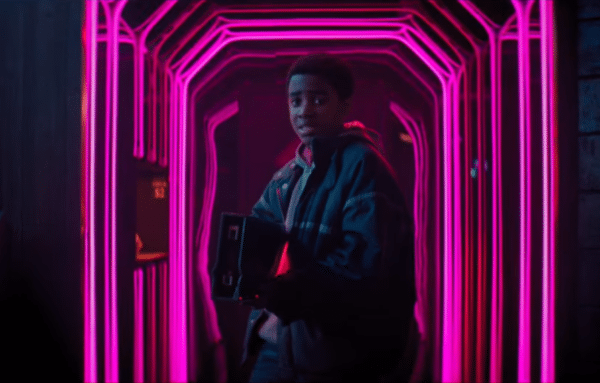In 2014, brothers Jonathan and Josh Baker made Bag Man, an impressive short film about a young boy who wanders out of New York City clutching a duffle bag that contains a deadly secret. Two years later they expanded it into a feature film, Kin, which plays as a love letter to, of all things, Charles Band’s rather forgettable 1978 science fiction epic Laserblast. Released in August 2018, the film was a box office flop and was panned by both critics and audiences alike.
In Detroit, 14 year old Eli is in trouble at school. At home, his adoptive father (a grizzled Dennis Quaid) and recently released from prison step-brother Jimmy (Jack Reynor) butt heads leaving Elijah no-one to turn to. One day he finds an advanced super-weapon in an abandoned building and after a tragic turn of events is forced on th erun with Jimmy, heading for Lake Tahoe pursued by the police, an angry mob of criminals (led by a scenery chewing James Franco) and a pair of alien bikers…

Kin‘s major flaw is that no-one involved with it seemed to have any idea what kind of film they were trying to make. It flip-flops back and forth between a family drama, a road movie, crime thriller and science fiction, often forgetting about all other genres while it focuses on one before disconcertingly shifting back again. The alien pursuers – who have the ability to freeze time but only use it at the climax when it’s deemed dramatically necessary – are forgotten about for great chunks of the film, the crime drama is unconvincing and the family at the centre of the film are too dull be of much interest. Daniel Casey’s script all too readily falls back on moth eaten cliches (Zoë Kravitz is wasted in a stripper-with-a-heart-of-gold role), shows little interest in moving the meagre plot along at anything more than a snail’s pace and eventually pulls a late-in-the-day twist that requires the already lumbering plot to grind to a halt completely for an indigestible dollop of exposition.
There are possibly several good films struggling to get out of Casey’s muddled script – had he and the Baker’s opted to make noir-ish crime thriller, a study of troubled teens in the appalling pre-apocalyptic world of inner city Detroit or a Laserblast-inspired tale of teens messing with dangerous alien technology, they might have been onto something. Attempting all three seems to been have beyond them and the result is a good-looking, well-acted but stodgy affair that doesn’t do any of its various plot strands justice. It also sells its cast of characters short. Although Myles Truitt’s Eli is a likable enough protagonist whose petty acts of rebellion and low-key criminality seem entirely in keeping with his circumstances, the rest of the characters are either cyphers (Kravitz’s Milly), unlikable (Reyner’s Jimmy) or so ridiculous that it’s hard to take them seriously (Franco’s villanous Taylor). There’s not enough to any of them really to care that much about what happens to them “Just be better than me,” Jimmy deadpans to Eli during a Terminator (1984)-inspired police station shoot-out which is really not asking all that much. He’s such an irresponsible and selfish dick that almost anyone – with the exception of Franco’s cartoonish bad guy – is already better than Jimmy.

A lot is left unexplained, as if scenes were shot but jettisoned before release. The eventual reveal of what’s going on and who one of the main characters really is comes too late in the day to make any real impact though it offers a brief glimpse of producer Michael B. Jordan in a cameo. Withholding information from the audience is no bad thing if it’s handled properly, but when your film runs out of time, leaving you no choice but to have one of the hitherto minor characters recount the back story in an egregious info-dump something has clearly gone terribly wrong. The final shot suggests that Casey and the Bakers’ had a sequel in mind. The poor US box office will surely have put paid to that.
Truitt comes out of Kin the best (along with Scottish post-rockers Mogwai who contribute an impressive, brooding score), suggesting a real talent that should blossom in better roles and the Baker’s showed real talent in Bag Man, whose quiet lyricism is sadly missed here. Both films have moments of real beauty but Bag Man, which is even more enigmatic than Kin but rather better handled, emerges as the better film. Kin is too sloppy, too schizophrenic to be anything other than a good-looking also ran that never makes good on many of its more interesting ideas.